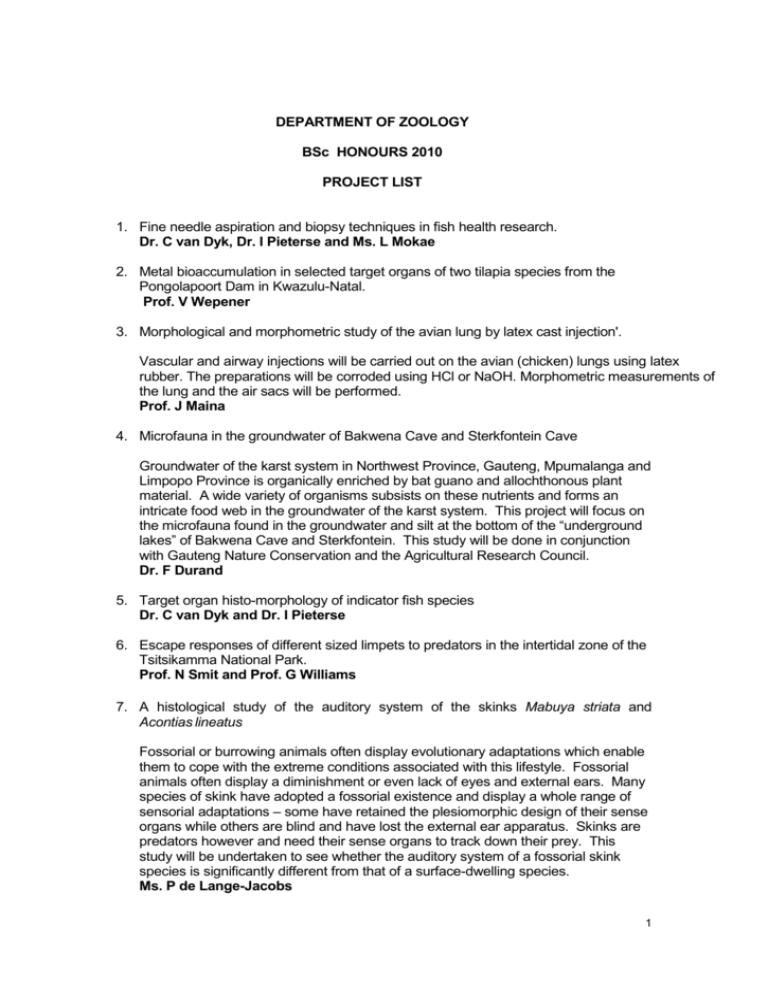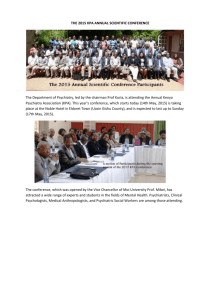DEPARTMENT OF ZOOLOGY BSc HONOURS 2010 PROJECT LIST
advertisement

DEPARTMENT OF ZOOLOGY BSc HONOURS 2010 PROJECT LIST 1. Fine needle aspiration and biopsy techniques in fish health research. Dr. C van Dyk, Dr. I Pieterse and Ms. L Mokae 2. Metal bioaccumulation in selected target organs of two tilapia species from the Pongolapoort Dam in Kwazulu-Natal. Prof. V Wepener 3. Morphological and morphometric study of the avian lung by latex cast injection'. Vascular and airway injections will be carried out on the avian (chicken) lungs using latex rubber. The preparations will be corroded using HCl or NaOH. Morphometric measurements of the lung and the air sacs will be performed. Prof. J Maina 4. Microfauna in the groundwater of Bakwena Cave and Sterkfontein Cave Groundwater of the karst system in Northwest Province, Gauteng, Mpumalanga and Limpopo Province is organically enriched by bat guano and allochthonous plant material. A wide variety of organisms subsists on these nutrients and forms an intricate food web in the groundwater of the karst system. This project will focus on the microfauna found in the groundwater and silt at the bottom of the “underground lakes” of Bakwena Cave and Sterkfontein. This study will be done in conjunction with Gauteng Nature Conservation and the Agricultural Research Council. Dr. F Durand 5. Target organ histo-morphology of indicator fish species Dr. C van Dyk and Dr. I Pieterse 6. Escape responses of different sized limpets to predators in the intertidal zone of the Tsitsikamma National Park. Prof. N Smit and Prof. G Williams 7. A histological study of the auditory system of the skinks Mabuya striata and Acontias lineatus Fossorial or burrowing animals often display evolutionary adaptations which enable them to cope with the extreme conditions associated with this lifestyle. Fossorial animals often display a diminishment or even lack of eyes and external ears. Many species of skink have adopted a fossorial existence and display a whole range of sensorial adaptations – some have retained the plesiomorphic design of their sense organs while others are blind and have lost the external ear apparatus. Skinks are predators however and need their sense organs to track down their prey. This study will be undertaken to see whether the auditory system of a fossorial skink species is significantly different from that of a surface-dwelling species. Ms. P de Lange-Jacobs 1 8. A histological study of the reproductive system of the amphipod Sternophysinx calceola and S. filaris The amphipods Sternophysinx calceola and S. filaris occur in the groundwater in Gauteng, Northwest and Limpopo Provinces. Little is known of their reproduction and reproductive systems. This study will be the first of its kind to determine the morphology of the male and female reproductive system of these freshwater amphipods. Ms. P de Lange-Jacobs 9. Nematodes associated with the Natal long-fingered bat (Miniopterus natalensis) colony in Bakwena Cave Colonies of the Natal Long-fingered Bat (Miniopterus natalensis) occupy dolomite caves on the Egoli Grassland Biome. The majority of cave-dwelling organisms that make up the karst ecosystem found in the dolomites depend on the bat guano directly or indirectly as source of nutrients. This project will focus on the nematodes found in the bat faeces in Bakwena Cave in Irene. This study will be done in conjunction with Gauteng Nature Conservation and the Agricultural Research Council. Dr. F Durand 10. A histological assessment of selected target organs of two tilapia species from the Phongolapoort Dam in Kwazulu-Natal. A semi-quantitative histological assessment of selected target organs (gills, liver, kidney and gonads) of Oreochromis mossambicus (n = 12) and Tilapia rendalli (n = 18) collected from gill nets in the Pongolapoort Dam in November 2009. The practical aspect of the project will involve the processing of tissue samples for light microscopy analysis, age determination, and a semi-quantitative histological assessment. Dr. C van Dyk and Prof. N Smit 11. Biomarker levels in selected target organs of two tilapia species from the Phongolapoort Dam in Kwazulu-Natal. Prof. J van Vuren 12. Metal bioaccumulation in brown mussel (Perna perna) from harbours along the South African coastline. Prof. V. Wepener 13. Antifertility effects of Carica papaya (paw paw seeds) on the gonads of Oreochromis mossambicus Dr. I Pieterse 14. Pathology of Monogenean infections on gills of Tilapia fishes in Lake Tanganijka Prof. A Oldewage 15. Three-dimensional serial section computer reconstruction of the airway and vascular systems of the avian lung'. Suitable for somebody with interest in computing and handling of complex softwares. Knowledge in programming not necessary. Serial sections of fixed bird lung will be cut and stained with H&E. Photographs will be taken and 3-D reconstruction of the airways and blood vessels performed by Chimera software. Prof. J Maina 2 16. Study and describe the unique structure of the attachment clamps in Diplozoon form Labeo umbratus by means of light and scanning electron microscopy. Prof. A Oldewage 17. Exogenous administration of steroids and feminization of male fish Dr. GM Pieterse 18. Study and describe the damage caused by the attachment clamps in Diplozoon on Labeo umbratus gills by means of light and scanning electron microscopy. Prof. A Oldewage 19. Water quality and animal diversity in pans in Mpumalanga Prof. J van Vuren and Mr. M Ferreira 20. Effective culturing of Hydra using different growth media. Dr. A Nel and Ms. Y Cloete 3





